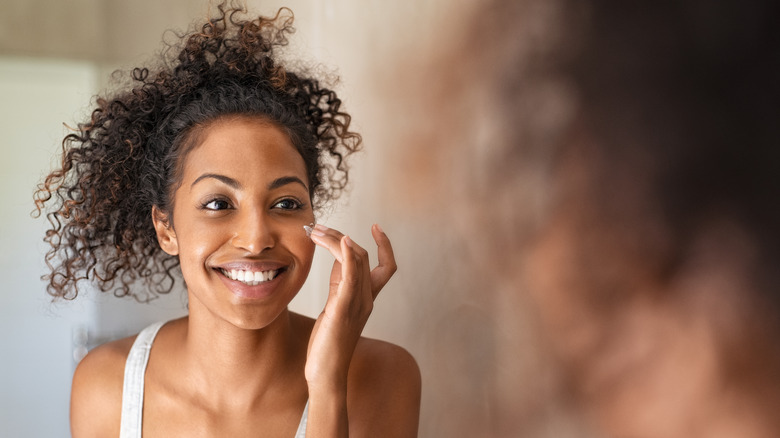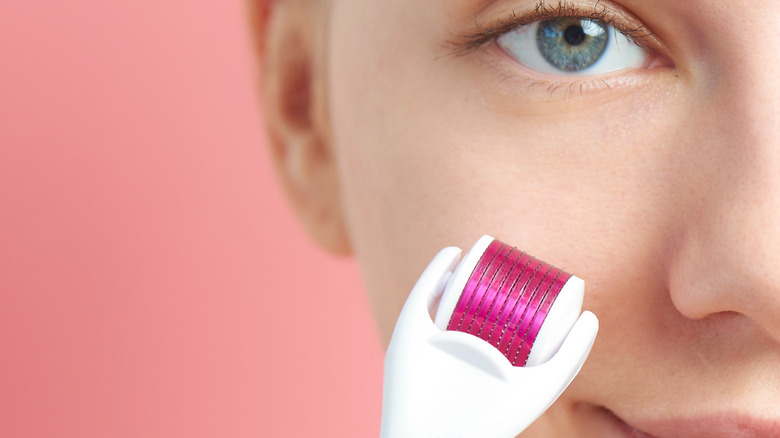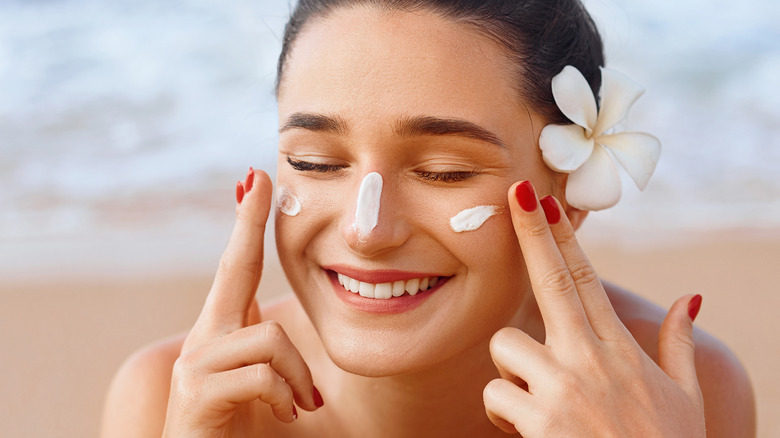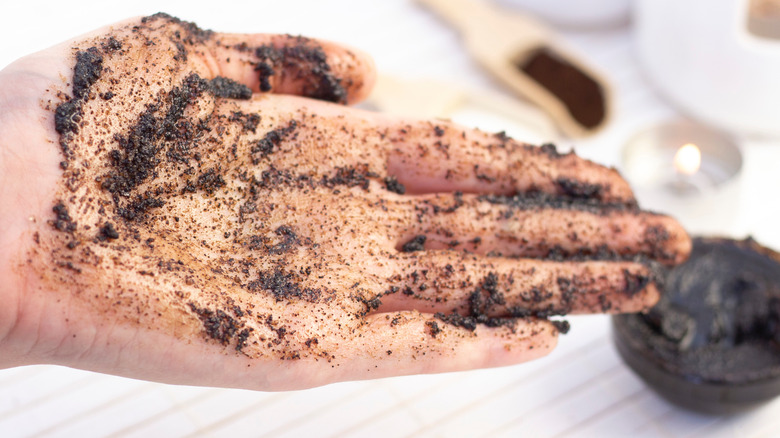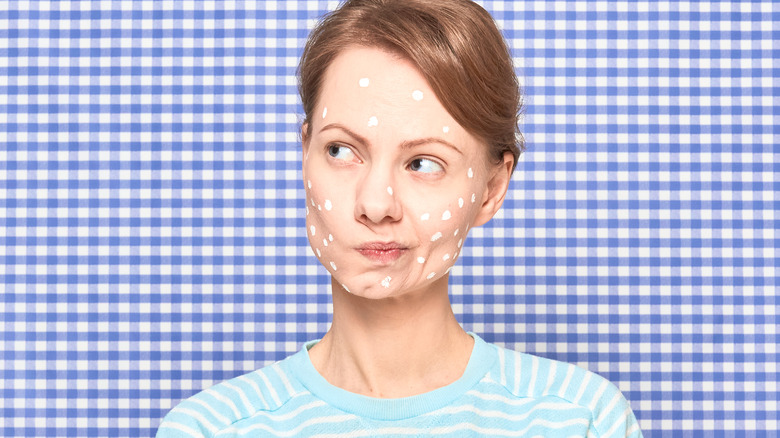TikTok Skincare Trends You Should Start Thinking Twice About
Tik Tok trends are the guiding force of an entire generation. They've given us choreographed dances, recipes, hilarious sound bites, and an endless supply of devastatingly cute animals. But when it comes to the app's advice ... take it with a few pounds of salt. The TikTok beauty and skincare community is ripe with tips and tricks for applying makeup and achieving a clear complexion, but some of these users' techniques will actually cause more harm than good to your body's largest organ.
Avoid the sand trap of damaging your skin by always doing your own research. Make sure to verify any skincare trend or beauty dupe that's taken over your "For You" page by first checking out what dermatologists have to say about it. Sure, most of the "TikTok" friendly products, such as CeraVe (via Teen Vogue), are trending for a reason — they work. But there's always an exception to the rule. Here are a few trends you'll want to steer clear of to prevent premature aging, infections, and breakouts.
At-home microneedling should be avoided
TikTok star Trina Albus has attracted over 39,000 subscribers with her beauty tips dedicated to the 40 and above crowd. Albus' video on "at home microneedling" (via TikTok) claims to help reduce the look of acne scars, hyperpigmentation, and wrinkles. Sounds good, right? According to fellow TikTok star and dermatology resident physician, Dr. Muneeb Shah, it's actually "a terrible idea" (via PureWow).
The main focus of microneedling is to create microscopic holes in the skin, thus signaling the body to produce collagen and elastin to repair the self-inflicted damage. But when done at home without a professional, the risk of infection is amplified.
"Our skin barrier does an excellent job of keeping moisture in the skin and keeping allergens and bacteria out of the skin," Shah explained. "By poking tiny holes at home, it can lead to infection, allergy and irritation." Instead, Shah suggested ditching your personal dermaroller and shelling out for professional microneedling at either a "medispa, dermatologist office, or esthetician office."
Sunscreen contouring is a trend that isn't going to help your skin
This one should be common sense, but the internet loves to push boundaries. TikTok user Eli Withrow has amassed quite the following, with over 54,000 subscribers, but her video dedicated to sunscreen contouring may be her most popular with over 1 million likes. In the TikTok, Withrow urges followers to apply a base of SPF 30 sunscreen to their entire face, following it up with SPF 90 for any areas of the face "you would put highlighter on," such as the bridge of your nose, cheekbones, and chin. According to Withrow, "The sun will contour your face where you'd put bronzer and you'll be naturally snatched all summer."
This advice would give any dermatologist a heart attack and Dr. Muneeb Shah is no exception. "The uncovered areas are now exposed to damaging UV radiation which can lead to aging, hyper pigmentation and skin cancer," Shah said (via PureWow). If your heart is set on achieving this natural contour, Shah urged users not to "skimp on the [base layer] sunscreen" and reapply consistently. As noted by the Skin Cancer Foundation, it's important to look for a face sunscreen that has both a high SPF and has broad spectrum coverage, as it'll protect the skin against harsh UVA and UVB rays.
Coffee grounds face scrubs aren't as good for your skin as you might think
While DIY face scrubs are an affordable and fun quarantine activity, you may want to skip out on using your morning brew as an ingredient. TikToker Cher Hubsher walked her over 200,000 subscribers through the process of making a coffee scrub face mask with her mom. Their ingredients include coffee grounds, sugar, turmeric, and dairy-free yogurt. Though turmeric may help Hubsher with swelling thanks to its anti-inflammatory properties (via Healthline), scrubbing coffee grounds on the skin is a HUGE no-no.
Sure, caffeine is loaded with antioxidants that de-puff the skin and reduce redness, but according Mona Gohara, a dermatologist at the Yale School of Medicine, coffee grounds straight from the grinder can cause "micro tears" in the skin, via Insider. You may think you're scrubbing away dead cells, but really you're irritating your skin. Instead of rubbing leftover grounds on the face, Dr. Muneeb Shah suggested using your homemade scrub to soften rougher areas of the body, like elbows, knees, and feet, via PureWow.
Using toothpaste or potatoes on pimples isn't the best option for your skin
Battling pimples is a tale as old as time, a war waged from the second we enter puberty up until ... well, forever. Several TikTok users have taken a creative approach to battling clogged pores. TikToker Ellie Pacheco recommended followers "put toothpaste on your pimples when you pop them" to reduce scarring and dry out acne. User Samantha Aramon also took an unconventional approach by taping a potato to her face overnight (via TikTok). We wish we were joking. But, as horrified as we are by both methods, they appeared to yield results!
So is the toothpaste method really beneficial? According to Medical News Today, not really. Toothpaste contains ingredients including sodium lauryl sulfate and sodium bicarbonate, and while the concoction can seem to help, it can actually irritate the skin even more. Medical News Today noted that people with dry skin in particular should avoid the trend, as it can make their skin even more dry and sensitive.
As for potatoes, Dr. Muneeb Shah claimed it's not the spud itself, but the salicylic acid inside the starchy vegetable, that's responsible for drying out zits. Skip the impractical step of trying to sleep with a potato stuck to your face and use a pimple patch instead. Shah recommended "a hydrocolloid pimple patch or a benzoyl peroxide infused spot treatment," according to PureWow. So you heard it here — research TikTok skincare trends before giving them a shot.
